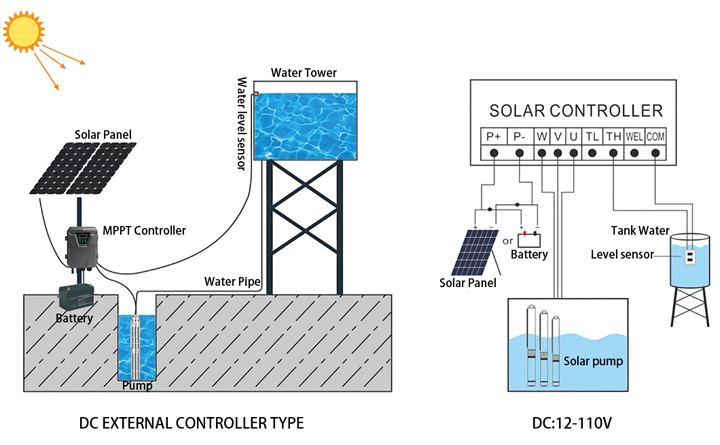Industry News
View All Products
en
A Solar Water Pump has become a practical solution for sustainable water supply in both agricultural and domestic contexts. By using energy directly from the sun, it eliminates reliance on grid electricity or fuel, making it cost-effective and environmentally friendly. To better understand its role, let us explore how a Solar Water Pump works, where it can be applied, and why it is especially suitable for remote and off-grid areas.
What is a Solar Water Pump and How Does It Work?
A Solar Water Pump operates by converting sunlight into electrical energy through photovoltaic (PV) panels. These panels generate power that drives the pump’s motor, which then moves water from a source such as a well, river, pond, or underground aquifer. systems include a controller or inverter that regulates power to maximize efficiency, even when sunlight conditions change during the day.

Unlike traditional electric or diesel pumps, a Solar Water Pump does not require a fuel source or grid connection. It is often paired with a water storage tank rather than a battery, allowing water to be pumped during daylight hours and stored for later use. Some modern pumps use brushless DC motors, which reduce internal wear, lower maintenance needs, and extend service life. This technology makes a Solar Water Pump a reliable and durable option for long-term use.
Where Can a Solar Water Pump Be Used?
The applications of a Solar Water Pump are broad and versatile. One of the common uses is in agriculture. Farmers often rely on solar pumps for irrigation, especially in sunny regions where crops require large amounts of water during the growing season. Because the demand for water is during sunny days, the natural alignment of supply and demand makes a Solar Water Pump particularly effective.
In gardens and landscaped areas, a Solar Water Pump provides an efficient way to water lawns, flowerbeds, or decorative ponds. It can be integrated into drip irrigation systems, ensuring plants receive steady hydration without wasting water.
For livestock owners, a Solar Water Pump is valuable in providing drinking water to animals in pastures or remote grazing fields. It reduces the need for manual hauling of water and ensures a consistent supply where electricity may not be available.
Households in rural settings can also benefit. A Solar Water Pump can deliver water for daily domestic use, such as cooking, cleaning, and bathing. It can fill elevated storage tanks, supplying water at a steady pressure without depending on the grid. This makes it equally useful for small communities, schools, or rural clinics.
Is a Solar Water Pump Suitable for Remote or Off-Grid Areas?
One of the greatest advantages of a Solar Water Pump is its suitability for remote or off-grid regions. Many rural communities face challenges with electricity supply, and extending grid infrastructure can be costly. A Solar Water Pump offers independence from the grid, drawing only on the abundant energy of the sun.
This independence makes it especially beneficial for farmers, ranchers, or households located far from urban centers. In such areas, fuel costs for diesel pumps are often high due to transportation, and power outages may limit the reliability of electric pumps. By contrast, a Solar Water Pump runs whenever sunlight is available, with minimal operating costs. With proper system sizing and occasional maintenance, it provides a dependable and long-lasting water solution.
Moreover, the environmental benefits should not be overlooked. A Solar Water Pump reduces reliance on fossil fuels, cuts carbon emissions, and supports more sustainable agricultural and domestic practices. For governments and organizations focused on rural development, this makes solar pumping an attractive and scalable option.

A Solar Water Pump is more than just an alternative to traditional pumps—it is a forward-looking solution that combines practicality, efficiency, and sustainability. By harnessing solar energy, it delivers water where it is needed , whether in fields, gardens, livestock areas, or households. Its ability to function independently of grid power makes it especially valuable in remote and off-grid regions.
With continued improvements in solar panel efficiency and pump technology, the Solar Water Pump is set to play an increasingly important role in providing reliable water access worldwide.
